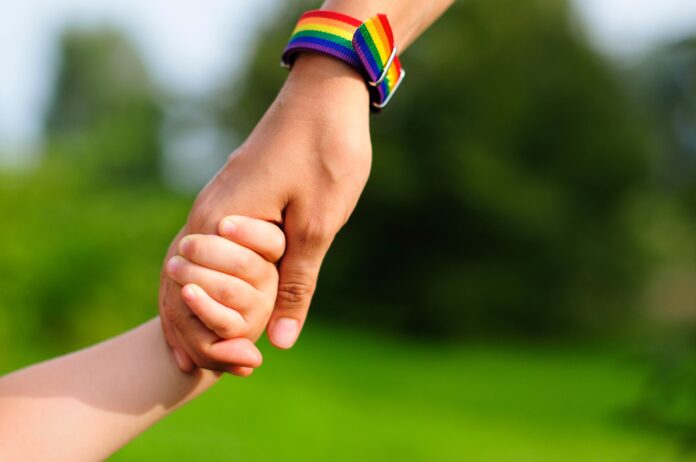A new study looks at how the overturning of Roe v. Wade has impacted queer parents—and includes the often-unheard voices of those who may be at higher risk of unintended pregnancies, such as bisexual cisgender women partnered with men. It shows how many queer parents, particularly in abortion-hostile states, are worried about access to reproductive and sexual health care, and offers insight into how this has changed their sexual, reproductive, and parenting lives.
The peer-reviewed study, “Perceived Impact of the Overturning of Roe v. Wade on Queer Parents’ Reproductive and Sexual Lives” (Sexuality Research and Social Policy, 2024), was conducted by Abbie E. Goldberg, professor of psychology at Clark University; Lea Silvert, Ph.D. candidate in clinical psychology at Clark University; and Brittany Charlton, associate professor at Harvard Medical School. It surveyed a sample of 99 queer parents, recruited online, who had all given birth between 2018 and 2023.
Among cis participants, 59 self-identified as bisexual, queer, or pansexual women, partnered with cis men; six as lesbian, bisexual, queer, or pansexual (LBQ+) women partnered with cis women; four as LBQ+ women with nonbinary partners; two as LBQ+ women with trans women partners, and 10 as unpartnered LBQ+ women. Among nonbinary participants, 10 were partnered with cis men, three had nonbinary partners, three had trans women partners, and one was unpartnered. The one transgender man had a cis man partner. Of the total, 88 (89%) had at least one child via intercourse with their partner; an additional four (4%) with someone other than their partner.
The participants were from 34 states; 53 lived in a state where abortion was banned or restricted. More than 80% considered themselves lower, working, or lower middle class; more than a quarter lived below the federal poverty level. Most (78%) identified as white; 22% were people of color or multiracial.
In line with prior research on queer birthing individuals, participants also reported “high levels of birth trauma, pregnancy loss, and pregnancy complications.” These experiences, the paper says, “likely contributed to their fears of being unable to access reproductive healthcare, including abortion, should they experience a high-risk pregnancy that necessitated interventions that might be illegal.”
The study found that two-thirds of participants (67%) were “upset but not surprised” about Dobbs v. Jackson Women’s Health Organization, the decision that overturned Roe; another 29% were “upset and surprised.” Although a few participants felt “neutral” about it, the authors say their narrative responses indicated not indifference, but rather a “lack of agency to do anything about the decision except perhaps to distance themselves from more intense feelings.” Only one person was “pleased but not surprised.”
Those in states with abortion bans and restrictions were more likely to express fear as well as outrage at Dobbs. “I feel terrified,” related Marisa, a white, cis, pansexual woman in Indiana. Other participants said that Dobbs increased their levels of stress, depression, and anxiety.
Some participants also spoke to the impact of intersecting racial/ethnic, socioeconomic, or other identities. Eve, who lived in Florida, said, “Being a Black queer woman, the effects of the ruling are outsized for me. My demographic already has the worst maternal outcomes. This is essentially a death sentence for many people like me.” And Denise, a white, cis, bisexual woman in Oklahoma, said, “I live in absolute fear of becoming pregnant again, knowing that I don’t have the … resources to travel through multiple states for care.”
That fear of unintended pregnancy was shared by almost half of the participants (46%); twice as many in abortion-hostile states expressed this than in abortion-protected states (60% vs. 29%). Almost a third of participants were also very worried about access to birth control and about emergency contraception.
These fears led some participants to change their contraception methods, double up on methods, and/or to take other precautions (like more closely tracking their cycle or having a partner “pull out”). About one-sixth of the participants (all but one in abortion-hostile states), said anxiety over Dobbs had reduced their sexual desire or enjoyment. Others said they were simply having less sex as a result of Dobbs.
The authors note, too, that those in abortion-hostile states were afraid of needing to seek an abortion not only in the case of an unintended pregnancy, but also if they experienced complications with a wanted pregnancy. Even though all of the participants were still of childbearing age, many, especially in abortion-hostile states, spoke of not having further children because of the risk of complications in a climate of restricted access to care. Vera, a white, cis, bisexual woman in Texas, said she would likely get her tubes tied, because “With two previous C-sections and a state that doesn’t care about my health or well-being, it feels like too big of a risk to try again.”
Two-thirds (66%) of participants in abortion-hostile states said they had “considered and/or taken steps toward moving” because of Dobbs, but many also identified financial and other barriers to doing so. Even in abortion-protected states, participants still expressed anger at Dobbs, and several worried that it signaled threats to other rights, such as marriage equality and gender-affirming care.
These findings will help researchers and sexual/reproductive health educators better understand the impact of national changes in reproductive health policy, the authors say, and will assist healthcare providers in being better advocates for their patients.
Additionally, policymakers can use the findings to “highlight the on-the-ground impact of current reproductive policies for some of the most marginalized and invisible individuals affected by them, and, in turn, highlight the need for more research and advocacy on their behalf.”

